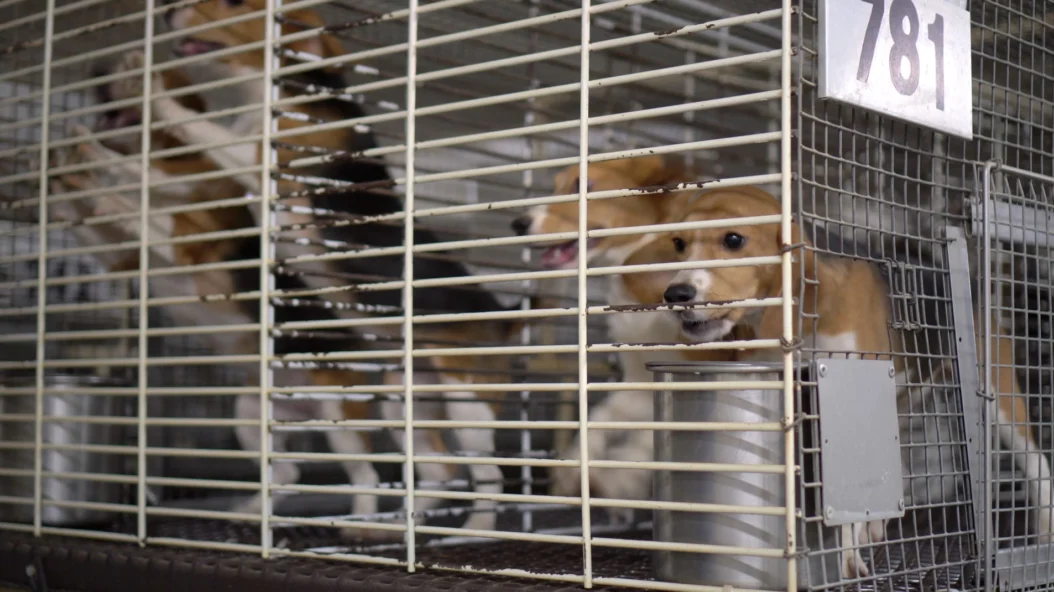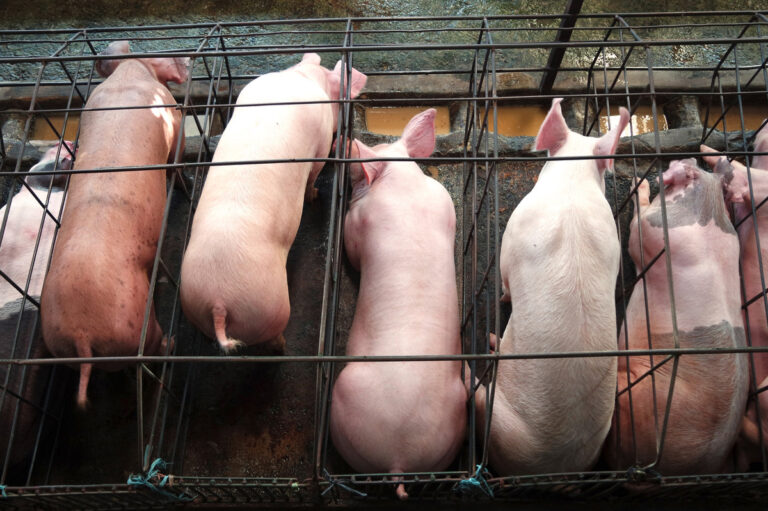BUsiness of Animal Welfare
Wisconsin Case Signals Broader Retreat from Beagle Breeding for Labs
Ridglan Farms becomes a symbol of the clash between outdated practices and modern science
By the Editors

When the Wisconsin State Veterinary Examining Board voted unanimously to suspend the license of Dr. Richard Van Domelen, the lead veterinarian at Ridglan Farms, the decision marked more than a professional sanction. It symbolized the growing vulnerability of a commercial enterprise built on the mass breeding of beagles for laboratory use — a business in place for decades but now squarely at odds with innovative science, recent policymaking, and public values.
Ridglan Farms, founded in 1966 in Blue Mounds, Wisconsin, has for nearly six decades operated as one of the nation’s largest breeders of beagles for biomedical research. The facility confines an estimated 3,000 to 4,000 dogs, raised in dank, utilitarian conditions and sold to pharmaceutical companies, contract research organizations, and university laboratories across North America. Beagles are favored in such settings because of their gentle temperaments and compliant natures — traits that, tragically, make them attractive subjects for invasive tests.
Despite decades of work in this space, the company has kept a notably low public profile. It advertises an “extensive historical database for reproductive performance and pedigrees,” but little verifiable information exists about its leadership or finances. A 2015 news story identified co-owner and president Jim Burns, though the current executive structure remains opaque. Today, as regulators, legislators, and scientists pivot away from animal testing, Ridglan is in crisis.
A Facility Under Siege
Regulators and animal advocates have documented a range of disturbing conditions at Ridglan: unlicensed staff performing painful surgeries such as “cherry eye” removals without anesthesia, dogs confined in cramped and barren cages without outdoor access, injuries caused by wire flooring, and unsanitary facilities rife with accumulated feces and poor ventilation.
In 2017, members of Direct Action Everywhere entered the facility, removed three beagles, and documented conditions inside — an action that led to felony burglary charges against activists, later dismissed at Ridglan’s own request. In October 2024, Dane4Dogs and other groups petitioned a judge to appoint a special prosecutor to investigate animal cruelty at the facility. Judge Rhonda Lanford ruled in January 2025 that there was probable cause that Ridglan had violated Wisconsin’s animal cruelty laws, leading to the appointment of La Crosse County District Attorney Tim Gruenke as special prosecutor.
In April 2025, Ridglan retaliated with a civil lawsuit against Dane4Dogs, alleging interference with its business, including encouraging customers to cut ties with the company. The legal pressure has only deepened as the Wisconsin Department of Agriculture, Trade and Consumer Protection (DATCP) cited Ridglan in September for more than 300 violations of animal welfare laws and offered to settle the matter with a $55,000 civil forfeiture. Ridglan declined, pushing the case into the hands of the Dane County District Attorney.
Adding to the scrutiny, investigative reporters have raised questions about the fate of dogs at Ridglan. FOX6 Investigators reported that between 2019 and 2020, the company sold more than 1,700 dog carcasses to NASCO Education, which identified Ridglan as its No. 1 supplier. NASCO emphasized it purchased only carcasses, not live animals, but the sheer volume of dead dogs is left unexplained. Despite repeated inquiries from April through September 2025, attorneys representing Ridglan deflected questions and offered no public accounting of how the company came to have so many dead dogs for sale.
The suspension of Van Domelen’s license was not sudden, but rather on a slow boil. Earlier this year, regulators allowed him to practice under restrictions, but new evidence of mistreatment and mishandling tipped the scale: he had allegedly delegated hundreds of surgeries to unlicensed staff, sometimes without anesthesia. In mounting a defense, Van Domelen likened his lapses to a parent helping a child with math homework — an analogy that underscored, rather than mitigated, the gravity of his misconduct.
Meanwhile, a Wisconsin judge has appointed a special prosecutor to investigate potential felony animal cruelty charges, citing probable cause that the company caused “unnecessary and excessive pain or suffering.”
Collectively these are enterprise threats to this business, which avoided scrutiny by keeping a low profile, maintaining drab complexes in a rural community, and proffering the idea that the business of animal testing was something of a necessary evil. But with new human-based biology screening techniques, testing on beagles is no longer necessary, and all that remains is what animal advocates describe simply as an evil.
A Failing Paradigm
The Ridglan saga is more than the story of a single dog-breeding operation supplying animals for invasive and painful tests. It is a case study in transition — a company becoming a casualty of moral and scientific progress as society embraces a more humane and effective economic model. For decades, federal law required new drugs to undergo animal testing before advancing to human trials, a Depression-era mandate that persisted long after evidence showed its limits. In fact, more than 92 percent of drugs that succeed in animal testing ultimately fail in human clinical trials because of unexpected toxicity or ineffectiveness.
“Ridglan Farms is a horror show for beagles,” said Wayne Pacelle, president of Animal Wellness Action and the Center for a Humane Economy. “This suspension marks an important first step in holding it accountable. This facility has no redeeming value in a nation moving away from beagle breeding and it should be shuttered.”
Tamara Drake, director of research and regulatory policy for the Center, notes the futility of propping up a system already in retreat. “Taxpayer dollars should not underwrite cruelty and corner-cutting at facilities that repeatedly break the law,” she said. “We have formally asked the National Institutes of Health to stop funding experiments that use beagles procured from Ridglan.”
Momentum for Reform
The policy context has shifted dramatically in recent years. In 2022, Congress enacted the FDA Modernization Act 2.0, repealing the federal mandate that all new drugs be tested on animals. The reform opened the door for regulators to embrace alternatives such as organoids, organs on chips, and advanced computational models.
In April 2025, the FDA went further, publishing its “Roadmap to Reducing Animal Testing in Preclinical Safety Studies.” The plan establishes a three- to five-year horizon in which animal testing will become the exception rather than the rule. Soon after, the NIH announced a new Office of Research Innovation, Validation, and Application to accelerate adoption of human-relevant science. And in late 2024, the U.S. Senate unanimously passed the FDA Modernization Act 3.0, which requires the agency to align its regulations with the 2022 law.
The Environmental Protection Agency has already pledged to phase out mammalian testing for chemicals by 2035. Taken together, the moves amount to a broader reconfiguration of biomedical and regulatory science, with animal-based methods at risk and the breeding companies and other apparatuses of the animal-testing industrial complex looking obsolescent and scrambling to hold onto their profits and relevance.
Organs-on-a-chip can replicate human tissue function with extraordinary precision. Artificial intelligence models can predict toxicity by analyzing molecular structures. Stem-cell-derived organoids allow researchers to study disease processes in human cells directly. These technologies promise not only more humane research but also faster, cheaper, and more predictive results.
The outcry that followed the 2022 revelation of horrific conditions at Envigo, a now-shuttered Virginia-based beagle-breeding facility demonstrated that the public doesn’t much like when it sees inside the bowels of these facilities. Ridglan is a close cousin of Envigo in terms of operations and mistreatment of beagles. It’s time for this company to be shuttered, too.
If the company stubbornly obscures its real work and regulators fail to act with urgency, facilities like Ridglan could limp along, siphoning taxpayer funds and dishing out more suffering to dogs. Worse, the company will risk undermining public trust in both science and government. As Drake explains: “Aligning the statute with regulations will eliminate confusion for drug sponsors, lead to more cures, cut drug-development time, lower drug prices, and confirm the FDA’s stated commitment to reducing and replacing animals in drug development.”
The Ridglan case also underscores the importance of whistleblowers — former employees and advocates who documented neglect, improper surgeries, and systemic failures. Without their courage, much of the evidence against the facility might never have surfaced. Protecting and amplifying such voices is essential if systemic cruelty is to be rooted out.
The potential unraveling of Ridglan Farms illustrates how science, ethics, and law can imperil companies whose work is built on systemic mistreatment of animals. Businesses that seemed durable and entrenched are especially vulnerable when exposed for cruelty and when innovations make their methods obsolete.
The movement to end reliance on animal testing is not utopian. It is pragmatic, grounded in evidence, and consistent with a society that refuses to separate compassion from innovation.

"Ridglan Farms is a horror show for beagles, This suspension marks an important first step in holding it accountable. This facility has no redeeming value in a nation moving away from beagle breeding and it should be shuttered.”
Wayne Pacelle, president of Animal Wellness Action and the Center for a Humane Economy

Who Bought Beagles from Ridglan Farms (2019–2020)
Investigative records show thousands of beagles from Ridglan Farms were sold to universities, pharmaceutical firms, and contract research organizations. Here are the recent top buyers and how the dogs were used:
- Nasco Education — 1,736 beagles (carcasses only): Sold for classroom dissection kits and K–12 science education.
- TRS Labs — 934 beagles (animal drugs): Used in veterinary drug and vaccine development.
- IIT Research Institute — 752 beagles (human drugs): Preclinical research in toxicology and drug safety.
- Merck Animal Health — 512 beagles (animal drugs): Veterinary medicine and vaccine testing.
- Elanco — 500 beagles (animal drugs): Research on pet health and farm animal care products.
- Boehringer Ingelheim–Merial — 438 beagles (animal drugs): Companion and livestock vaccine and treatment development.
- Zoetis — 436 beagles (animal drugs): Development of veterinary medicines and diagnostics.
- Labcorp (formerly Covance) — 416 beagles (human drugs): Contract drug development and safety studies.
- East Tennessee Clinical Research — 367 beagles (animal drugs): Veterinary clinical trials for pharmaceuticals.
- Nucro-Technics Inc. — 308 beagles (human drugs): Toxicology and regulatory testing for pharmaceuticals and biotech.


